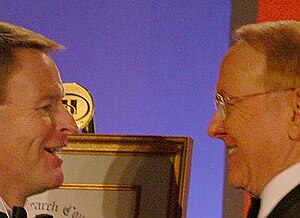| Tony Perkins and James Dobson in 2007 in Washington, DC at the Values Voters conference (Photo credit: Wikipedia) |
I raise this subject because I believe it is one of the most important challenges facing those of us who value freethought, secularism, reality-based education, and skepticism. Raising this subject usually involves criticizing political conservatives, and Simic's article does do that too; however, I am not convinced that such a partisan slant is absolutely necessary even if I tend to agree with much of it.
When I read Simic's article, I find myself asking the following questions:
- If he's right about an increase in "widespread ignorance bordering on idiocy," and I believe he is, why is this happening?
- How did we reach this sorry state of affairs?
- As we begin to understand the nature of the problem, what can we possibly do to fix it?
On the question of why this is happening, I think Simic explains it fairly well.
The ideal citizen of a politically corrupt state, such as the one we now have, is a gullible dolt unable to tell truth from bullshit.To the extent that the U.S. has become a politically corrupt state, an ignorant citizenry is an ideal situation for those in power. And "power" in this context is far broader than those holding political office; it extends to those with wealth and influence who are benefiting from corruption in various ways. To understand why this is happening, we need only ask ourselves who is benefiting from this state of affairs.
An educated, well-informed population, the kind that a functioning democracy requires, would be difficult to lie to, and could not be led by the nose by the various vested interests running amok in this country.Follow the money. Who is getting obscenely wealthy as a result of an increasingly ignorant population? Consider the many ways a well-educated, skeptical populace would be bad for business and politics on both sides of the political spectrum.
How Did We Get to This Point?
In many ways, the how question seems even easier to answer than the question of why. We have seen growing opposition to public education, the glorification of the ignorant as "real Americans," and the gradual replacement of informative news with sensationalized "infotainment" and blatant propaganda. And as Simic explains, those of us working in public education find ourselves in a position to directly observe the cumulative effects of these developments. He mentions the changes in what kids entering college know about history, including even local history. I've seen this too, but what strikes me as even more dramatic is the decline in critical thinking and the intentional celebration of ignorance. For too many kids, ignorance has actually become a source of pride.
What is refreshing different about Simic's article is that he does not take the usual way out by blaming everything on what kids are learning (or failing to learn) at the high school level. He mentions parents as well as the organized efforts of those who benefit from having an ignorant population.
It is the product of years of ideological and political polarization and the deliberate effort by the most fanatical and intolerant parties in that conflict to manufacture more ignorance by lying about many aspects of our history and even our recent past.This important because it suggests that efforts to fix the problem that do not address the news media, the use of propaganda on Americans by Americans, and deliberate political deception are unlikely to be real fixes. He also cautions us from being content to point the finger at the media outlets we don't care for.
No doubt, the Internet and cable television have allowed various political and corporate interests to spread disinformation on a scale that was not possible before, but to have it believed requires a badly educated population unaccustomed to verifying things they are being told.What Can We Do?
So what can we do to fix the problem? I believe this may be the key question facing those of us who are alarmed by what we are witnessing. I think we can agree that there are no easy fixes. Yes, meaningful educational reform is necessary, but I have little reason to think that it will be sufficient. Yes, divorcing corporate money from the political process is necessary, but is it even remotely realistic that this could happen? It is difficult to imagine that doing any one thing is going to solve the problem. A multi-component solution will likely be necessary, and it may take a generation or more to show results once implemented. On my more pessimistic days, I'm not even sure the problem is fixable.
To pick just one example used by Simic to which you will be able to relate, consider the claim that "Christians are persecuted in this country." It is often repeated, broadcast uncritically by our news media, and believed by a great many people. So what? I'd argue that this undermines secularism, fuels anti-atheist bigotry, and makes it far more difficult to engage in productive discussions about the role of religion in public life. We know the claim is false, but what do we do about it? What do we do about the fact that our increasingly ignorant population embraces it uncritically?
I don't have any profound answers to the question of what we can do about our culture of ignorance, but I am convinced that this is a problem in desperate need of solutions. Even if we are not yet at the point-of-no-return from which fixing the problem is no longer realistic, I have to think that there could be such a point out there in the future. I'd hate to think that there ar things we could be doing now to make a difference that we aren't doing.
H/T to The Morning Heresy
